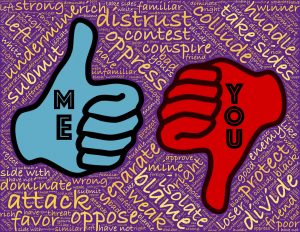
Modern technology, international business, cooperation through cross-cultural projects, a steady increase in the number of international travelers – shouldn’t it all bring people together and create more cosmopolitanism? Paradoxically, while having all these opportunities to connect, we seem to be moving further away from this ‘togetherness’, and, as current political trends indicate, towards separation and fragmentation into sub-groups. Moreover, people increasingly seem to feel mistreated, discriminated against or generally threatened, which translates into clinging to these sub-group identities and fighting for them.
American lawyer and professor Amy Chua, author of the book ‘Political Tribes’, argues that when groups feel threatened, they retreat into tribalism, and that this ‘law of the jungle’ and primitive tribal instincts have reached a new peak now. Looking around the world, we can indeed see a rising emphasis on identities of gender, race, sexuality, culture or religion. There is the ‘black lives matter’ movement of the African-American community, the ‘Me too’ campaign fighting for women issues, gender identity controversies, constant racial discrimination cases, and numerous transgressions of someone’s rights being called out on a daily basis in social media. An interesting perspective was provided by a recent poll, which investigated Americans’ experience of discrimination and found that pretty much everyone now thinks he or she is being discriminated against, including the white majority. Indeed, as Amy Chua puts it, we could be facing a zero-sum competition, ‘Oppression Olympics’, over which group is the least privileged.
I certainly don’t intend to question the fairness of these feelings, or the general motive of reducing inequalities and intolerance in the world, but I do question whether zeroing in on a specific identity, picking a side, and then fighting for the selected side is helpful. As the previous examples indicate, efforts to make everyone even and erase discrimination can go wrong, and the resulting identity politics can be quite divisive. Stanford University political scientist Francis Fukuyama calls identity politics one of the ‘chief threats’ facing liberal democracies and diverting us away from bigger and more important problems, that all humanity faces.
Is an identity-driven view of the world any different from that of a diverse organization? Although there is strong evidence for embracing diversity in organizations, there is also a sensible notion of picking the right focus. In a relevant Forbes article, expert Paolo Gaudiano suggests that organizations stop focusing on diversity, and instead promote inclusion, while tracking diversity as a measure of successful inclusion. Gaudiano argues that a continuous push for diversity in organizations can have negative ripple effects, similar to the rise of identity politics, for instance. Specifically, there can be a backlash from members of any sub-group majority within an organization. Take the example of Google, whose ex-employee filed a lawsuit against the company, claiming it discriminates against white male conservatives. According to the lawsuit filing, Google uses ‘illegal hiring quotas to fill its desired percentages of women and favored minority candidates, and openly shames managers of business units who fail to meet their quotas—in the process, openly denigrating male and Caucasian employees as less favored than others’. Echoing this experience, Gaudiano warns against increasing diversity numbers, because a push for hiring ‘diverse candidates’ for example may create a hostile internal environment in the organization, which creates barriers for inclusion.
In general, both in business and the larger socio-political context, embracing diversity and striving for inclusion and equal opportunities seem to be humane values in the 21stcentury. Yet, how best to pursue these values remains an open question. One fundamental question worth considering is whether a focus on diversity instead of similarity, which per se creates labels and groups, makes us choose the box we belong to, and finally contrast our ‘own box’ with the ‘others’, is the right way to go?

